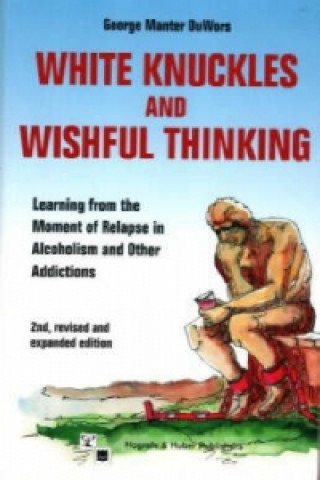
Kód: 04755299
White Knuckles and Wishful Thinking
Autor George DuWors
This book aims to explain the moment of relapse, and to provide practical help for counsellors and clients struggling to avoid relapse. The ideas and techniques are compatible with the Alcoholics Anonymous and other 12-Step progra ... celý popis
- Jazyk:
 Angličtina
Angličtina - Vazba: Brožovaná
- Počet stran: 400
Nakladatelství: Hogrefe & Huber, 2000
- Více informací o knize

Mohlo by se vám také líbit
-

Dune
216 Kč -

Haunting Adeline
621 Kč -

Berserk Deluxe Volume 2
1092 Kč -

White Nights
89 Kč -

Powerless
268 Kč -

Atomic Habits
330 Kč -

Dune Messiah
228 Kč -

Berserk Deluxe Volume 3
1142 Kč -

One Day
221 Kč -

Berserk Deluxe Volume 1
1115 Kč -

Iron Flame
368 Kč -

Surrounded by Idiots
213 Kč -

Harry Potter and the Prisoner of Azkaban (Minalima Edition)
993 Kč -

Gravity Falls Journal 3
443 Kč -

Heaven Official's Blessing: Tian Guan Ci Fu (Novel) Vol. 1
420 Kč -

The Creative Act
568 Kč -

Dune
276 Kč -

Hunting Adeline
624 Kč -

A Little Life
290 Kč -

Children of Dune
230 Kč -

Heaven Official's Blessing: Tian Guan Ci Fu (Novel) Vol. 2
427 Kč
Informovat o naskladnění knihy
Zadejte do formuláře e-mailovou adresu a jakmile knihu naskladníme, zašleme vám o tom zprávu. Pohlídáme vše za vás.
Více informací o knize White Knuckles and Wishful Thinking
 Anotace knihy
Anotace knihy
This book aims to explain the moment of relapse, and to provide practical help for counsellors and clients struggling to avoid relapse. The ideas and techniques are compatible with the Alcoholics Anonymous and other 12-Step programmes. DuWors explores the one relentless empirical fact about addictive relapse: at the moment of picking up the first drink/drug we all say one of two things - either "One won't hurt" (or a handful of "wishful" variations) or "Who cares?" (or a smaller, less frequent list of "white knuckle" variations). What does this mean? Why is it that so many different people - different addictions, different stages of the illness, different educational and cultural backgrounds - all say the same thing at this critical moment? After all, this is the very moment that treatment and recovery strive to prevent. And if we could understand it, might we not help more people not have to repeat it? This book comes to the conclusion we have to try and enter the psychic world of the person living it, as well as the perspective of the would-be helper. Like the author, we must sift through psychological and biological theory. But the theories mean nothing if they do not connect with human experience. The book is written for three main groups: (1) professionals and others fighting on the chemical dependency front; (2) trainees seeking to join the fray and their teachers; and (3) clients whose counsellors recommend it. Two specific relapse experiences are the main focus of this approach: (1) exactly how to deal with the actual moment and process of relapse itself; and (2) how the addict looks at himself before and after drinking, and how this "split" plays a key role in perpetuating relapse and blocking recovery. There is one "nuclear" chapter for understanding the "wishful" relapse and another for the "white knuckle" relapse. You will find three chapters on denial, how it functions up to the moment of relapse. You will find three chapters on acceptance - what it is, how it happens, how it prevents relapse. All of the chapters specify tools for talking to self or others about the experience of relapse and how to prevent it from happening again. The relationship between recovery and spirituality is clearly spelled out in terms of the actual relapse experience. The 2nd edition introduces the SPARROW model for coping, for taking the "serenity prayer" down off the wall and putting it to work. Each chapter features study guides for students of chemical dependency and treatment exercises for those struggling with their own relapse.
 Parametry knihy
Parametry knihy
Zařazení knihy Knihy v angličtině Society & social sciences Society & culture: general Social issues & processes
- Plný název: White Knuckles and Wishful Thinking
- Autor: George DuWors
- Jazyk:
 Angličtina
Angličtina - Vazba: Brožovaná
- Počet stran: 400
- EAN: 9780889372245
- ID: 04755299
- Nakladatelství: Hogrefe & Huber
- Rozměry: 210 × 150 mm
- Datum vydání: 01. January 2000
Osobní odběr Praha, Brno a 12903 dalších
Copyright ©2008-24 nejlevnejsi-knihy.cz Všechna práva vyhrazenaSoukromíCookies



 Vrácení do měsíce
Vrácení do měsíce 571 999 099 (8-15.30h)
571 999 099 (8-15.30h)